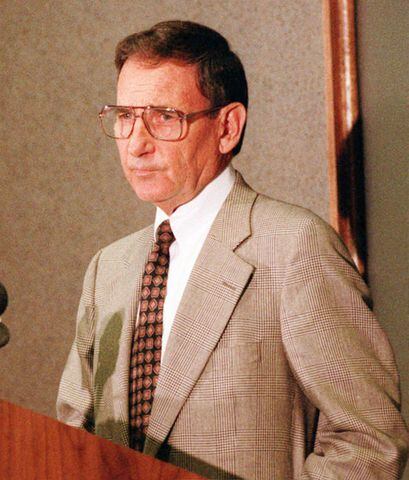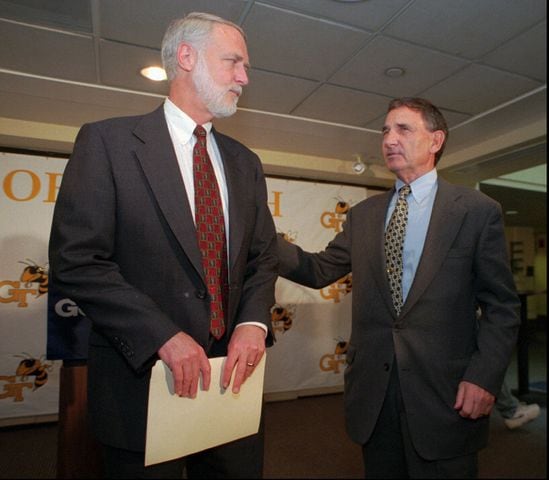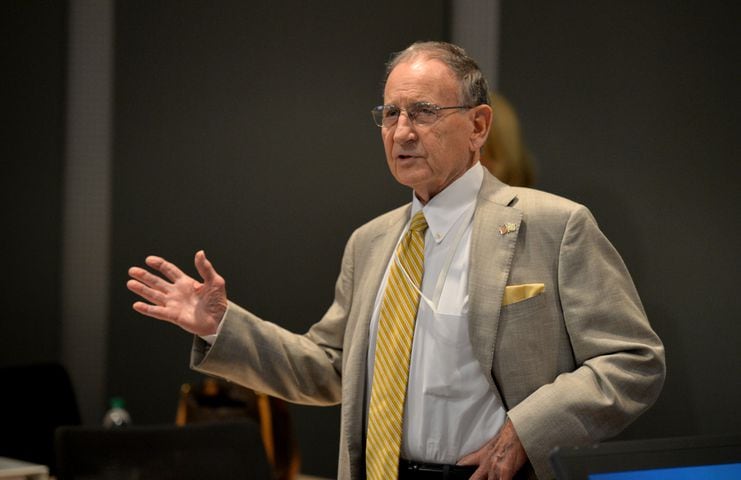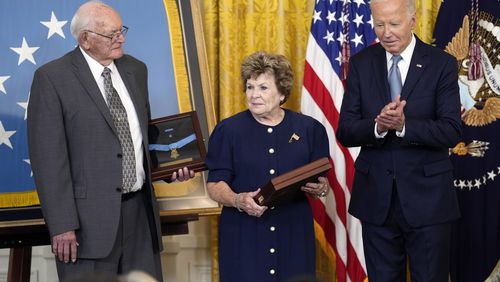Bobby Cremins has never been more worried about the state of college basketball, the game that gave him a career and made him a legend at Georgia Tech. Rosters are turned over annually as players come and go through the transfer portal – sometimes leaving at the coach’s insistence – in pursuit of more playing time, larger name, image and likeness deals or both.
“It just seems like it’s become a bidding war, and the highest bidders are going to get the best players,” Cremins said in a phone interview with The Atlanta Journal-Constitution.
Cremins voiced his concern following the death of Homer Rice, who died Monday at the age of 97. Tech’s peerless athletic director from 1980-97, Rice hired winners like Cremins and raised millions for facilities projects, lifting a moribund athletics program to unprecedented heights. But beyond that, he launched the Total Person program, designed to equip Tech athletes with the life skills to achieve personal and professional excellence past their playing days. It was so effective and valuable that the NCAA adopted the program and made life-skills education mandatory across Division I.
The program embodied a view of college athletics that even then was belittled and considered corny. It was not, presumably, a vision that anticipated athletes playing for three or four schools in their college careers and earning NIL deals worth six and even seven figures.
“If I’d have told Homer Rice that this was going to be like this 10 years ago, he might have fired me (had they still been working together),” Cremins said. “He might have thought I was crazy.”
It raises the question – as laudable as Rice’s ideals were, is there still a place for them in college athletics?
It’s easy to think there’s no way.
“I think it is harder now,” Tech golf coach Bruce Heppler told the AJC, speaking of college athletics broadly. “And it’s changed.”
Hired in 1995, Heppler is one of the last direct links to Rice remaining at Tech. For all the success that Rice fostered by hiring a slew of championship-winning coaches, Heppler might have been the best of all of them, as the 14 ACC titles and 15 NCAA top-10 finishes in his tenure would attest. Further, Heppler’s teams have achieved a spotless academic record.
But even from his position in a sport far from the spotlight of football and basketball, he recognizes the major tidal shift across college athletics.
“I think (Rice) had a real vision of, let’s make sure that, when they leave, that they know more than their sport and how to take care of themselves and how to do other things,” Heppler said.
And while winning has always mattered, his sense is that, at least in some cases, that priority has become singular.
“I would say that (Rice’s vision) is still going on, but I would say it’s going on at less places than it was before,” Heppler said.
In his role as a commentator on all things ACC for ESPN and SiriusXM radio, former Tech football captain Roddy Jones has been supportive of changes that have benefited athletes (largely gained through the NCAA’s many legal defeats). For instance, he finds amusing the complaints that NIL payments to athletes are not commensurate with what they’re actually worth.
“People are like, ‘Whoa, the fourth-string right tackle’s getting X,’” Jones told the AJC. “Well, someone’s paying the fourth-string right tackle X. So don’t blame the tackle, blame the person that’s writing the check. That person (receiving the money) obviously has some sort of value.”
But he still recognizes that college athletics has fallen out of kilter.
“Absolutely,” Jones said. “It has gone too far.”
Jones sees that relationships – athlete/coach, athlete/school – have changed. The idea of “team as family” becomes dated when rosters turn over with each season.
“I think it has definitely become more transactional,” Jones said. “I think there was always a measure of that baked in before, but without many choices to leave. For student-athletes, you kind of suck it up and go with it. But, yeah, it absolutely has.”
But, for as much as Heppler and Jones (and anyone else who has paid attention) have witnessed a revolutionary change, they also believe that the mission to prepare athletes for adulthood beyond refining their jump shot remains viable.
As Jones sees it, even if athletes are shuffling in and out, it doesn’t mean that academics, community service and leadership development can’t be stressed.
Said Jones, “I don’t think that a guy spending a year at a place, two years rather than four should change the mission of the place.”
And while life-skills training is mandated by the NCAA, it does require intentionality to do more than check boxes. In Heppler’s perspective, Tech athletic director J Batt has been a committed steward of Rice’s vision, with the aid of assistant AD/student-athlete development Kevin Cone. A former Tech football player who played in the NFL (including the Falcons), Cone earned a mechanical engineering degree from Tech and then an MBA at Georgia State and worked in player development with the Falcons. Cone was hired by former Tech AD Todd Stansbury in one of his final acts before his dismissal in September 2022.
At Tech, subjects such as leadership development and total wellness continue to be put in front of athletes in a program that has evolved over time. Cone particularly has helped develop connections between athletes and former Tech letterwinners and alumni.
“I worry about the overall sport, but they’ve found the right person to take over that program at our place, and Kevin is incredible,” Heppler said. “He is dedicated and committed to all those kids.”
In a statement to the AJC, Batt said that Rice’s philosophy continues to be important.
“As the (college athletics) model shifts, student-athletes will have even more personal responsibilities and, at its core, the Total Person philosophy is about developing the skills to embrace personal responsibility beyond the field of competition,” Batt said. “In that context, I am even more confident that Dr. Rice’s philosophies will be critical for the next generations of student-athletes and continue to recognize his legacy of leadership.”
One area that has gained increased relevance – financial literacy, notably income taxes and investing. They are subjects that surely have gained athletes’ attention in the NIL age more than they did previously.
It is probably not what Rice would have envisioned. But at a time when college athletics has gone off track, trying to follow the path set by one of its wisest caretakers makes all the sense in the world.
About the Author














